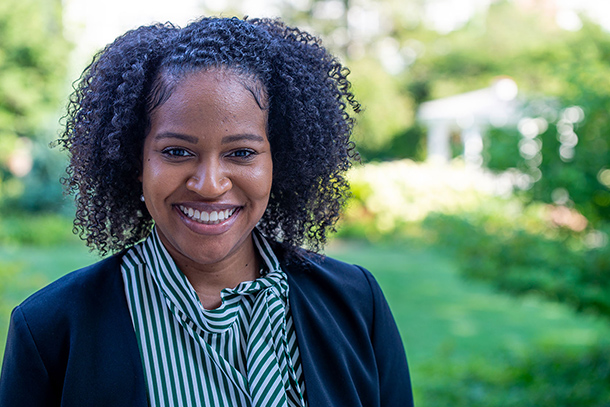
Lauren Griggs was named the new director of the Multicultural Engineering Program in the College of Engineering. Image: Tyler Henderson
New Multicultural Engineering Program director named
09/18/2019
By Ashley WennersHerron
UNIVERSITY PARK, Pa. – Lauren Griggs, a biomedical engineer by training, has been selected to direct Penn State College of Engineering’s Multicultural Engineering Program (MEP). The program is open to all engineering students with the goal of fostering community for traditionally underrepresented students in the field.
MEP is housed within the Center for Engineering Outreach and Inclusion (CEOI), which includes several programs designed to support students as they navigate their undergraduate and graduate engineering studies.
“We’re glad to welcome Dr. Griggs to Penn State,” said Tonya Peeples, associate dean for equity and inclusion, director of CEOI and professor of chemical engineering. “She has a deep understanding of what it takes to succeed as an engineering student and how important it is to build community that will offer support throughout a student’s studies and into their career.”
Griggs most recently completed postdoctoral training at Vanderbilt University, after earning her doctoral degree in biomedical engineering at Virginia Commonwealth University (VCU).
“As a graduate student and postdoctoral scholar, I had the opportunity to engage with undergraduate students in the lab,” Griggs said. “That’s where I discovered my true passion of mentoring students.”
While scientific discoveries in the lab were slow and incremental, Griggs found that students retained a positive spirit.
“Even with the smallest thing, I could see the light of discovery in another scientist’s eyes,” Griggs said. “I was re-energized every time.”
Throughout her undergraduate and graduate studies, Griggs honed her mentoring skills by participating in and leading several events to empower students in science, technology, engineering and math (STEM) disciplines. At VCU, she served as a research mentor on the dean’s Undergraduate Research Initiative with the goal of guiding an undergraduate student through a research project, from experimentation through the presentation of results. She also served as a program coordinator for the National Science Foundation’s Louis Stokes Alliance for Minority Participation program, supporting the academic, professional and cultural development of underrepresented students majoring in a STEM discipline.
She credits her own mentors with teaching her how to provide guidance and support.
“The student experience goes beyond Calculus I,” Griggs said. “Mentors, both formal and informal, equip students by offering a wholistic view of the engineering academic environment.”
According to Griggs, undergraduate students may be focused on a specific type of engineering, providing an opportunity to teach them the breadth and depth of work that an engineer can accomplish.
“My mentors taught me that engineering is innovation; engineers are innovators – across disciplines within engineering,” she said. “My role is to support students as they innovate solutions and advance engineering through all stages of education and as they enter their careers.”
Griggs spent her scientific career studying how cells utilize their environment to integrate and respond to various signals.
“There’s a scaffolding that helps support cells, and that applies to people,” Griggs said, stressing the importance of having a support system in college and beyond. “Discovering how cells work helped me understand how people work.”
Griggs has specific goals as the MEP director, including recruiting and retaining more students and improving graduation rates. She’s also interested in supporting graduate students along their academic journeys.
“The further underrepresented students proceed in engineering disciplines, the more apparent it becomes that they are few and far between,” she said. “And when you’re an undergraduate, the idea of obtaining a postdoctoral fellowship may seem out of reach—especially if you don’t see someone like you already doing it. It is my responsibility to encourage students to pursue these opportunities and to provide support in the midst of these very real challenges.”
She pointed to alumni as key players in helping students persist.
“Alumni are the all-stars,” Griggs said. “Students can see how people with similar experiences have overcome obstacles. They see that there is an end game, and they can accomplish great things.”
Alumni are equally eager for Griggs to lead MEP.
"She is a living embodiment of what it looks like when equity and inclusion work in the STEM field, at all levels of the academic process, is done well,” said Kwesi Vincent, a 1999 Penn State graduate in electrical engineering and current board member for the CEOI. “In addition to her own personal success, she has demonstrated the ability to mentor and coach other students of color to the same level of success she’s attained. Dr. Griggs’s high level of communication skills and overall professionalism are also key attributes that I feel will help her work effectively with not only the alumni community, but with students, faculty and staff as well."
Griggs said she is particularly enthusiastic about the full circle culture of Penn State.
“There is this great community from the first-year students through to alumni, many of whom return to continue fostering that sense of belonging amongst all students,” Griggs said. “I’m so excited to join the Penn State family and contribute to building that community.”

